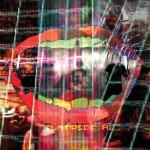
Animal Collective Centipede Hz
(Domino)
The hesitation on the lyric “Let it go” during Centipede Hz’s second track, Today’s Supernatural, is a surprisingly apt summation of the album as a whole. With the wildly acclaimed Merriweather Post Pavilion in 2009, Animal Collective had made their poppiest album, mostly conforming to familiar structures and instrumentation, letting their songwriting and textured production do the heavy lifting. Here, they try to let that pop-edge go, relying on extremely crowded production (adjusting on first listen will take even the biggest fans a few tracks), memories of radio transmissions and commercials, and what they call their “garage-rock roots” (though the results are decidedly more psychedelic). A bit of unpacking, however, and the hesitation on the above-stated lyric makes sense; dense as they are, these are 11 songs that conform to pop-structure more than it first appears. As with Merriweather Post Pavilion, that’s not a bad thing, but whether you prefer early AnCo or Strawberry Jam and Feels era AnCo or MPP AnCo, Centipede Hz is not going to disappoint you.
Indeed, what makes Centipede Hz so remarkable is that it could have been released anytime during the band’s tenure, and yet it captures a very specific moment in life (mostly for Avey Tare). It contains the white-noise and (actual) avant-gardism present in the albums released prior to the “Animal Collective” name but also melds Merriweather pop and experimental psychedelia of mid-2000s Animal Collective. Impressive as this is, an attentive listener (or anyone listening to their weekly radio shows) can point out influences from Pink Floyd and Portishead to genres unfamiliar to indie-rock fans like Peruvian Cumbia and Brazilian Forró.
Still, it is precisely this range of influences that make Centipede Hz so enchanting and so unique, but the same diversity makes the album a bit too abstract. Very little connects aggressive tunes likeToday’s Supernatural to the ballad Applesauce or the percussion-heavy, electronically tinged highlight Monkey Riches aside from the radio transmissions and white noise that start and end most of the tracks. This trick, falling somewhere between Radiohead’s Let Down/Karma Police/Fitter Happier transition and all of Frank Ocean’s channel ORANGE, ranges from unnoticeably fluid (New Town Burnout to Monkey Riches) to forced and overlong (Moonjock to Today’s Supernatural). It’s these bursts of static that ensure Centipede Hz feel like an album, but a loss of thematic focus at the end also reveals them as a unifying touch rather than an important expansion to the album's themes, and they occasionally downplay the versatility on display.
Thankfully, the best tracks still sound quite distinct: The opener Moonjock is conventionally musical, with Geologist’s beat and Deakin’s guitar taking the lead for the big chorus and most of the verses, while Avey’s straightforward narrative is the road-trip companion to his free-spirited Summertime Clothes, invoking The Beatles while letting the song sneakily crescendo toward an enormous climax that ends as quickly as it sneaks up on you. Later, the aforementioned Monkey Riches moves on to the present, playing like Avey Tare’s companion to Panda Bear’s My Girls. Running almost seven minutes, Monkey Riches is hypnotic where My Girls was dreamy, with a self-referential chorus (makes me wonder how I even wrote this song/does this not occur to almost everyone) delivered with the same profundity with which Panda Bear sang My Girls. The theme of looking out for a family is present, but Avey Tare more explicitly and confidently addresses societal expectations and conformity. The final clear highlight is the closer Amanita, and it is perhaps the best song on Centipede Hz, with a steady, bare percussive rhythm from Geologist, haunting bursts of guitar from Deakin, and some of the more melodic vocal lines (complete with Panda Bear’s best backing vocals on the album) that perfectly parallels the drug-induced subject matter and a bridge-outro that make it the most musical and ambitious songs in the discography.
The only shame in this is that Amanita departs so heavily from the theme of aging. Centipede Hz could have been Animal Collective’s Yankee Hotel Foxtrot, an album about looking back, aging, and finding love. The pieces are there in in the wordplay and optimism of Father Time, the ponderous Monkey Riches, quite explicitly in Today’s Supernatural and with a great metaphor in Applesauce, but the last few tracks don’t quite carry through with the ambitions, and the ballads are noticeably weaker than the upbeat tracks. Chief among those is Wide-Eyed, the first song in which Deakin takes lead vocals. It lacks the lyricism of Avey’s narratives and musings, interrupting a thematic development but also not offering much musically. Centipede Hz is Avey’s album (much like YHF was, thanks to a violent break-up with Jay Bennett, Jeff Tweedy’s), but Wide-Eyed takes Avey out of the spotlight too soon. With just a bit more of a push, Centipede Hz could have been something truly special, but as it stands, it’s a portrait of growing up that is wonderfully vivid but a tad unfulfilling, a collection of tracks boasting some remarkable tunes and a complex theme, and an album that is bound to satisfy both hardcore and casual fans.
3 September, 2012 - 10:35 — Forrest Cardamenis